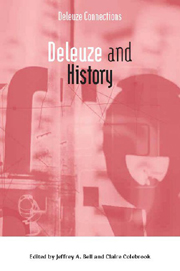Book contents
- Frontmatter
- Contents
- Introduction
- 1 Events, Becoming and History
- 2 Of the Rise and Progress of Philosophical Concepts: Deleuze's Humean Historiography
- 3 Theory of Delay in Balibar, Freud and Deleuze: Décalage, Nachträglichkeit, Retard
- 4 Geohistory and Hydro-Bio-Politics
- 5 The Thought of History in Benjamin and Deleuze
- 6 The Cannibal Within: White Men and the Embodiment of Evolutionary Time
- 7 Ageing, Perpetual Perishing and the Event as Pure Novelty: Péguy, Whitehead and Deleuze on Time and History
- 8 Cinema, Chronos/Cronos: Becoming an Accomplice to the Impasse of History
- 9 Deleuze's Untimely: Uses and Abuses in the Appropriation of Nietzsche
- 10 Is Anti-Oedipus a May '68 book?
- 11 Molar Entities and Molecular Populations in Human History
- Notes on Contributors
- Index
6 - The Cannibal Within: White Men and the Embodiment of Evolutionary Time
Published online by Cambridge University Press: 12 September 2012
- Frontmatter
- Contents
- Introduction
- 1 Events, Becoming and History
- 2 Of the Rise and Progress of Philosophical Concepts: Deleuze's Humean Historiography
- 3 Theory of Delay in Balibar, Freud and Deleuze: Décalage, Nachträglichkeit, Retard
- 4 Geohistory and Hydro-Bio-Politics
- 5 The Thought of History in Benjamin and Deleuze
- 6 The Cannibal Within: White Men and the Embodiment of Evolutionary Time
- 7 Ageing, Perpetual Perishing and the Event as Pure Novelty: Péguy, Whitehead and Deleuze on Time and History
- 8 Cinema, Chronos/Cronos: Becoming an Accomplice to the Impasse of History
- 9 Deleuze's Untimely: Uses and Abuses in the Appropriation of Nietzsche
- 10 Is Anti-Oedipus a May '68 book?
- 11 Molar Entities and Molecular Populations in Human History
- Notes on Contributors
- Index
Summary
On Pentecost Sunday, 1924, a strange spectacle presented itself to visitors to the German city of Hanover: men, women and children alike gathered in crowds on the numerous bridges, catwalks and gutters along the small river Leine, and frantically started fishing for bones, skulls and other human remains. A few days later, the police blocked the stream and searched the riverbed. The officers discovered more than 500 different parts of several human bodies. In the previous months, rumours had spread like wildfire: of human flesh sold on the market in Hanover, of traps set to snatch young men or boys, and of a werewolf looking for his prey. The hysteria infected the neighbouring villages and scared maidservants refused to enter the city for minor errands such as shopping (Lessing 1973: 17–18).
Eventually, on 23 June 1924, one Friedrich (Fritz) Haarmann was taken into custody. Born in Hanover in 1879, Fritz was known to the police to be a petty criminal and a homosexual. According to his confessions, Haarmann took advantage of the desperate situation many young men found themselves in when they arrived in Hanover. The city was a hub for the nationwide migration of young labourers during the first years of the Weimar Republic, and many of the men resorted to male-to-male prostitution as a means of survival. Haarmann invited such men to his flat, entertained them with food and drink, had sex with them and then killed some of them.
- Type
- Chapter
- Information
- Deleuze and History , pp. 121 - 141Publisher: Edinburgh University PressPrint publication year: 2009



